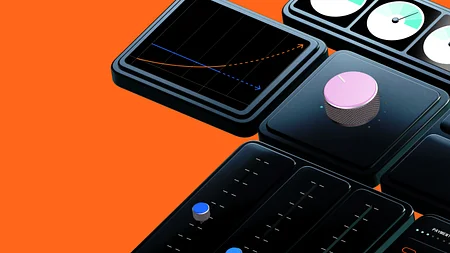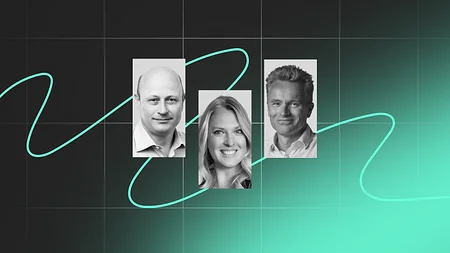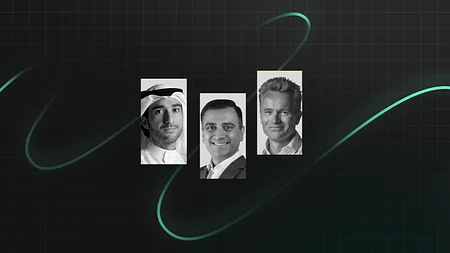Barclays UK CEO On The Exciting Challenges of Today
From dreams of running a five-star hotel to the reality of running a five-star bank, Ashok Vaswani, the CEO of Barclays UK, speaks with Simon Taylor about culture, digital transformation challenges and opportunities, front line staff empowerment and how Simon might be able to buy a Lamborghini in the future.
You’ve been at Barclays for a little while now. What’s your favourite customer story?
Oh my God, so many. I think the best one, I think maybe the best one was a little girl who looked at the Twitter logo and said, “Does the Twitter logo then grow up to become the Barclays eagle?” right? Like, I thought that was, like, really cool. But you know, right across, we had a gentleman, literally, Simon, 103 years old, and this 103-year-old gentleman got an iPad on Christmas from his grandchild, and the poor guy, you know, not quite sure what to do with it. So he walked into one of our branches, met a digital eagle, and said, “Can you help me? Set me up on how this thing works?” Oh, well now he loves it, right? He just loves it.
How did you find yourself CEO of one of the largest banks in the world, or certainly one of its key divisions in the UK? And did you always want to be in finance? Is this what you dreamed of as a child?
I don’t think I dreamed of it, actually, if I [was] left to my own devices, I wanted to become a general manager of a five-star hotel. That was really my dream. Growing up, my uncle used to have a, kind of, a retail outlet in the fanciest hotel in Bombay, so I was not allowed to take time off in summers, I had to go there and work, and I used to go home in the evening and see all these guys, really smart, really well dressed, you know, and I thought, “Man, this is the coolest thing.” My mum wouldn’t have it that way, she was very keen I become a doctor, so I guess we compromised and hit finance, so that’s how I landed up in finance.
So at FinTech Insider, we’ve talked a lot to challenger banks, and to some small companies about how they’re changing those customer stories and customer journeys, and we really get into their story. Barclays is, what, over 350 years old now, and I wonder what you think are the advantages and disadvantages of that history?
There’s a lot of advantages in terms of scale and stuff like that, right? We touch 24 million customers in the UK, so 63 million people, if you humour me, and say 15 million less than 15 years of age, that leaves 48, we touch one out of every two people in the UK. Now, that’s an awesome position to be in, right?
And even if Barclays is 350 years old, I am in the company only for the last five or six years, right? So I mean, what happened on my watch is what worries me. I have all the responsibility of making sure I don’t let all my predecessors down, and a goal to set up my successors in a great way. So my period with the company is short, even though the company is so long. Now, of course, we have the usual challenges, legacy systems, you know, some kind of legacy thinking, but I think for the most part, that cultural transition, we have actually been able to bridge.
And how have you started bridging that? What have been some key initiatives? How do you get somebody from a legacy mindset to the mindset they need to be in?
At the end of the day, a lot of the culture of a company is defined by the things they celebrate and the things they punish, right, and what we really try to do is celebrate anybody who’s taken the steps towards becoming more digital, right? Whether you’re a digital eagle, whether you’ve got-, participated in Digital Wings. Whether you’ve actually got a digital driving licence, whether you’ve participated in Code Playgrounds, whether you’ve gone to a Freeformers programme, we’ve put in so many programmes which allows people to participate at their pace, at their rate. We’re talking about, you know, hey, you’re using your smartphone every day, so why would you, the minute you walk into our building, stop using your smartphone for things like banking? Right? So you just make it, like, simple for them to adopt, and here’s where we find ourselves.
How do you make culture real for employees? It sounds like one of these things the execs speak about but the assembly ends and the schoolkids go back to the playground, and they’re naughty again?
We’ve been on this journey for a couple of years now, five years now, and every single day, it’s hammering home the same message. “This is what we want to do, this is what we want to do, this is what we want to do, look at what happened, that’s fantastic, that’s the way we want everybody to go,” and constantly be hammering that message, and you know, you land up getting there, right?
Who are your culture crushes? When you look at small organisations, large organisations, that have been through that transformation, outside of Barclays, who do you look at and say, you know, “This was done well, that was done well”?
Honestly, there’s not one, like, one hero company for me. We try and see it from many companies and many industries, right, we just recently had a leadership meeting which we called a stewards kind of meeting. We had the general manager of Tesla come and talk to us, right? And he said, “Think about this. Tesla, yesterday, market cap, crossed the market cap of Ford,” right. Ford sells 6.4 million cars. Tesla’s Model 3 is not out as yet, and yet their market cap has kind of taken over. You know, how do you, kind of, look at these kind of companies and say, “Wow, look at the transitions they’ve made,” right? On the flip side, look at what GM is doing, and look at what’s happening there. You know. Look at what happened to Netflix. Netflix started as a renting a CD kind of thing, see how they’ve changed their business model, right? So there are so many companies, and you kind of pick on that. Look at the regulator. Look at the Monetary Authority of Singapore, right? The kind of stuff they’re doing, incredible, right? So you try to take a broad range and say, “Look, this is happening across the board.”
In fact, I’ve now started having dinners with CEOs of other businesses, other industries, corporate clients of ours, and saying, “Hey, you guys are big, big, people like British Airways, AIG, GE, all these big companies, and say, “You guys are struggling with the same thing, we’re struggling with the same thing, can we actually talk together and, you know, do stuff.”
I don’t know if you know, but we’ve launched a Digital Eagles programme for FirstPort. We’ve launched a Digital Eagle programme for Chubb. These are big corporate clients of ours, and we’re saying, “We’re going to help you along the digital transformation.” So we help them, and you learn from that as well, right?
Famously, the issue Kodak had when they looked at the digital camera is they couldn’t understand how you sold film, and the business model transition is always interesting, as is culture change. At FinTech Insider, we spoke recently to Paul Titterton, one of your Managing Directors, and he wrote a blog post, “Making people a competitive advantage in the digital age.” What are your thoughts on that? Are people to be replaced by machines entirely? Are staff a disadvantage?
Absolutely not. Absolutely not. In the digital world, what matters the most is actually the people, right? You may need a different kind of person, you may need fewer, or, in some areas, more, in another area, but at the end of the day, it’s all about people, at least as of now. Artificial intelligence hasn’t crossed the bar where machines will replace human beings. You need somebody to be able to, you know, envisage what the future could look like. You need somebody to set the vision. You need many more engineers, you need many more data visualizers. You need completely new skills which, you know, didn’t even exist. I mean, think about it. Three years ago, if somebody told you, “I’m a data visualizer,” you would have said, “What the hell is that?” Today, everybody’s talking about data visualisation, right? So new skills are going to emerge, and this has been going on for a long period of time, and I think it’ll go on like that for a long time.
There’s a metaphor there in the skillsets that are different between the industrial economy, and people that worked on a production line, versus the creativity and the empathy and the ability to really understand what a customer’s going through. How do we move away from a process mindset into an empathy, and an empowerment of people, really at the front line, to make those decisions?
Think about this, think about it in the good old days. In the good old days, your front line were experts at taking stuff and then throwing it across the wall to centres of excellence at the back, right? So the centres of excellence at the back, their job was to try and catch as quickly as possible, process and get out of the way. The front line said, “Hey, we trust you that you will do it,” and life went on. When they didn’t catch, or they didn’t catch properly, or missed it, the front line said, “Oh, okay, you know, we’ll manage the customer.” Occasionally you had big fights between front line and the back office, and life went on that way. Today, in the digital age, everything else has moved to the first point of contact. So suddenly, the people at the first point of contact have the capability, but have to be trained, and things have to be made so simple that they can do it at the first point of contact. When you open an Apple phone, or a MacBook, or whatever product, they don’t come with a user manual, right? So why do we expect our frontline folks to have user manuals? How do you make it so easy for them, and make it identical to the way the customer sees it, right, so that everything happens at the first point of contact. But that requires a certain mindset and a certain skill. So this is the transformation that you’re really talking about, that comes from that cultural change that we just talked about.
What has been the highlight of your career so far, Ashok?
Why should I say the highlight of my career as if it’s over? The highlights are still to come, right? So far. Look, I’ve been in retail banking for a while, and I can tell you, I have never been as excited about what I’m doing as I am today, because the opportunities that technology today affords, and the kinds of things that you can dream of is stuff you could not dream of even five or seven years ago. And, you know, just taking existing products and services, and putting it on the internet, or putting it on the mobile, yes, that’s fun and stuff like that, but the creation of new business models, which is afforded by technology, is really, really critical. So, for example, we’ve got 24 million customers, a million SMEs, 25,000 corporate customers. Surely, and all of these guys are doing business with each other. Surely, we can become the platform which allows us to link what happens with these ecosystems, right? And so rewards is the first one we’ve done, Simon. So think about it, and say that these corporate customers are dying to get loyalty from these kind of retail customers, yes, if you are ready to give reward, we will tie you together, right? How powerful is that? It’s a real win for the corporate, it’s a win for the customer, it’s a win for us. But that is just the first step. This real platform which you can create, where people come to, to do everything which is, you know, related to money and finance, is a big, big, big idea.
Do you see experimentation, and a culture of trying small business models, and lots of them, rather than the big programmes that have to work, with lots of small new products, and new business models being tested. Is that what you see as the next ten years for Barclays?
I think there will be some of that big stuff, as well. I’m kind of focusing, ’16 and ’17 on really trying to automate the bank to a completely different level. The speed of change in this industry, as you know, Simon, is so fast that we can’t afford to spend time looking at the back. If I get totally automated, I’ve got to stop worrying about the back and start looking forward, and when I go forward, I’m going to take a series of bets and then see how things move, right? You start some place, God knows where it will move to, but start. Learn. Learn, and let’s see what happens, let’s see how it moves.
You mentioned you were really excited about the next few years. What is exciting you at the moment? What is it that you think, “This initiative, or these projects, or this happening in the industry-,” maybe it’s PSD2, maybe it’s open banking, maybe it’s the change in culture, maybe it’s just technology generally, or maybe it’s some regulations. Whatever it may be, what’s exciting you at the moment?
I think we can get to know customers and deal with customers in a completely different way, right? It really is enriching people’s lives, right? In any one of our individual lives, there are not more than 12 or 15 significant financial moments. The first time you buy a car, the first time you go to college, you get married, have kids, retirement, first home, second home. I am at seven, and I’ve already run out, right? But just take any one of these and let’s create a complete ecosystem for that. So let’s say, I know that Simon is in the market to buy a car, right? Because I know everything about Simon in terms of his demo, I may say, okay, Simon is the type of guy who’d love to have a Lamborghini. Now, because Simon wants a Lamborghini, and they are our corporate client, I tell Lamborghini, “By the way, I can serve up to you really prospects who are keen on buying your car,” right? So they say, “Fine,” they’re going to give Simon a test drive. So I facilitate Simon a test drive, I obviously give him the loan, I give him the insurance. By the way, I have an app which helps you get a better insurance, because they’re monitoring your driving habits. By the way, I’ve created a digital identity for you with the government, so you can do your MOT, your parking tickets and stuff like that. By the way, black circle-, automobile association is a client of mine, they gave you 10% off to get your automobile thing done. I create a complete ecosystem around the car buying moment.
So it’s about that end to end customer journey.
End to end, and looking at it from the customer’s point of view. This is not about Barclays products. This is, in fact, about saying, “I will pull it all together for you.” Simon, we get 4,000 address change requests a day. Now, as a customer when you come to me and say, “Change my address,” why can’t I be the one who says, “Okay, I know that, you know, you’re a customer of Thames Water, I know you’re a customer of British Gas, by the way I also know you’re a customer of Sky. Don’t worry, Simon, I’ll have your address changed everywhere.”
You’re a busy man, how do you get it all done? What’s your number one productivity hack?
Just get a team who gets it done!
That’s it. Delegate to people you trust Is the key, isn’t it? And what rule do you live your life by?
You know, I grew up in India. I grew up with very humble beginnings. I lost my father when I was, like, six years old, and it’s always been my mother and I. My mother was way ahead of her time, and you know, she studied a lot, and she always thought that I had not studied enough. I do have a double postgraduate, but she thought that was not enough.
Never enough for mum.
Never enough for mum. And I think the two things that she really taught me, one was, you’ve got to be really, really, really humble, because if you stop being humble, you stop learning, and learning is the most important thing you could ever do. You stagnate if you don’t learn. So humility and learning are two lessons which have kind of stayed with me, and it’s quite fascinating when you think about it, you know, what is a guy like me trying to do with technology? But if you keep an open mind, and you’re curious, and you’re ready to ask questions, and you’re ready and say, “Look, I don’t understand this stuff, explain it to me,” then there’s a different wisdom you can bring to the table. Therefore learning and humility, for me, are two huge things.



